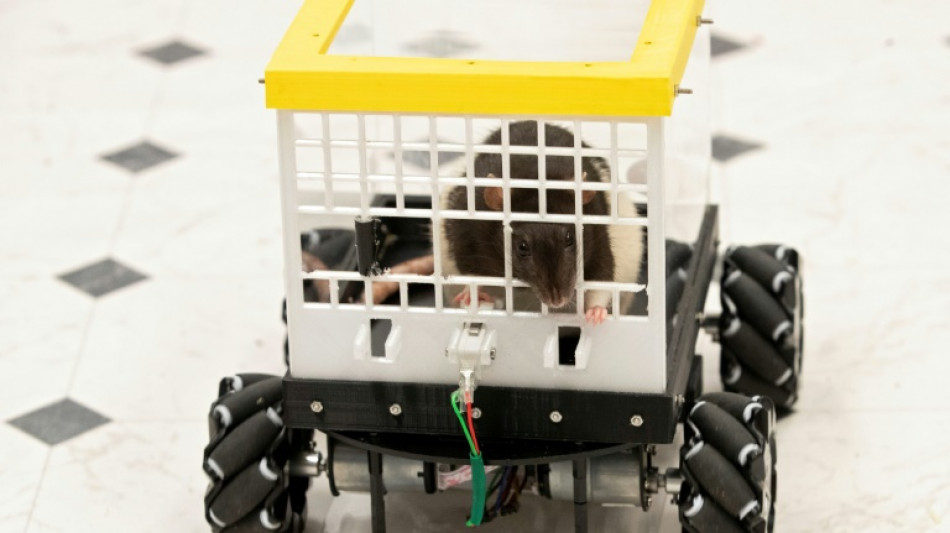
-
 Pope calls for 'arms to be silenced' in Christmas appeal
Pope calls for 'arms to be silenced' in Christmas appeal
-
Syria authorities say torched 1 million captagon pills

-
 Pope calls for 'arms to be silenced' across world
Pope calls for 'arms to be silenced' across world
-
32 survivors as Azerbaijani jet crashes in Kazakhstan

-
 Pakistan air strikes kill 46 in Afghanistan, Kabul says
Pakistan air strikes kill 46 in Afghanistan, Kabul says
-
Liverpool host Foxes, Arsenal prepare for life without Saka

-
 Japan FM raises 'serious concerns' over China military buildup
Japan FM raises 'serious concerns' over China military buildup
-
Pope's sombre message in Christmas under shadow of war

-
 Zelensky condemns Russian 'inhumane' Christmas attack on energy grid
Zelensky condemns Russian 'inhumane' Christmas attack on energy grid
-
Sweeping Vietnam internet law comes into force

-
 Pope kicks off Christmas under shadow of war
Pope kicks off Christmas under shadow of war
-
Catholics hold muted Christmas mass in Indonesia's Sharia stronghold

-
 Japan's top diplomat in China to address 'challenges'
Japan's top diplomat in China to address 'challenges'
-
Thousands attend Christmas charity dinner in Buenos Aires

-
 Demand for Japanese content booms post 'Shogun'
Demand for Japanese content booms post 'Shogun'
-
As India's Bollywood shifts, stars and snappers click

-
 Mystery drones won't interfere with Santa's work: US tracker
Mystery drones won't interfere with Santa's work: US tracker
-
Djokovic eyes more Slam glory as Swiatek returns under doping cloud

-
 Australia's in-form Head confirmed fit for Boxing Day Test
Australia's in-form Head confirmed fit for Boxing Day Test
-
Brazilian midfielder Oscar returns to Sao Paulo

-
 'Wemby' and 'Ant-Man' to make NBA Christmas debuts
'Wemby' and 'Ant-Man' to make NBA Christmas debuts
-
US agency focused on foreign disinformation shuts down

-
 On Christmas Eve, Pope Francis launches holy Jubilee year
On Christmas Eve, Pope Francis launches holy Jubilee year
-
'Like a dream': AFP photographer's return to Syria

-
 Chiefs seek top seed in holiday test for playoff-bound NFL teams
Chiefs seek top seed in holiday test for playoff-bound NFL teams
-
Panamanians protest 'public enemy' Trump's canal threat

-
 Cyclone death toll in Mayotte rises to 39
Cyclone death toll in Mayotte rises to 39
-
Ecuador vice president says Noboa seeking her 'banishment'

-
 Leicester boss Van Nistelrooy aware of 'bigger picture' as Liverpool await
Leicester boss Van Nistelrooy aware of 'bigger picture' as Liverpool await
-
Syria authorities say armed groups have agreed to disband

-
 Maresca expects Man City to be in title hunt as he downplays Chelsea's chancs
Maresca expects Man City to be in title hunt as he downplays Chelsea's chancs
-
Man Utd boss Amorim vows to stay on course despite Rashford row

-
 South Africa opt for all-pace attack against Pakistan
South Africa opt for all-pace attack against Pakistan
-
Guardiola adamant Man City slump not all about Haaland

-
 Global stocks mostly higher in thin pre-Christmas trade
Global stocks mostly higher in thin pre-Christmas trade
-
Bethlehem marks sombre Christmas under shadow of war

-
 NASA probe makes closest ever pass by the Sun
NASA probe makes closest ever pass by the Sun
-
11 killed in blast at Turkey explosives plant

-
 Indonesia considers parole for ex-terror chiefs: official
Indonesia considers parole for ex-terror chiefs: official
-
Global stocks mostly rise in thin pre-Christmas trade

-
 Postecoglou says Spurs 'need to reinforce' in transfer window
Postecoglou says Spurs 'need to reinforce' in transfer window
-
Le Pen says days of new French govt numbered

-
 Global stocks mostly rise after US tech rally
Global stocks mostly rise after US tech rally
-
Villa boss Emery set for 'very difficult' clash with Newcastle

-
 Investors swoop in to save German flying taxi startup
Investors swoop in to save German flying taxi startup
-
How Finnish youth learn to spot disinformation

-
 South Korean opposition postpones decision to impeach acting president
South Korean opposition postpones decision to impeach acting president
-
12 killed in blast at Turkey explosives plant

-
 Panama leaders past and present reject Trump's threat of Canal takeover
Panama leaders past and present reject Trump's threat of Canal takeover
-
Hong Kong police issue fresh bounties for activists overseas


Rat race: What rodent drivers can teach us about mental health
The girls can't hide their excitement as they're brought out to the racing arena.
"Black Tail" is up first, taking a few seconds to sniff her surroundings before placing her paw on a lever and zooming away.
After storming to the finish line, she devours a well-earned Froot Loop hanging on a "treat tree."
Black Tail is one of the University of Richmond's rat drivers -- a group that first dazzled the world with their ability to operate tiny cars back in 2019.
Now, the rodents serve as ambassadors for the school's Behavioral Neuroscience Laboratory, headed by Professor Kelly Lambert.
"It gets people's attention about how clever and teachable these animals are," explained Lambert, who has to balance her affection for the furry speedsters with the need for scientific detachment -- naming them only by the Sharpie colors that mark their tails.
The idea of racing rodents started out as a playful challenge from a colleague.
But far from being a novelty act, the animals are part of a boundary-pushing project exploring the ways in which environmental enrichment sculpts the brain -- and could in turn hold potential for solving human mental health challenges.
For Lambert, one of the great failings of modern medicine has been its inability to cure mental illness through drugs, even as pharmaceutical companies have reaped in huge profits.
These pharmaceutical approaches have faced increasing scrutiny since a landmark study published in July questioned the theory that chemical imbalances, especially a lack of serotonin, cause depression.
- Froots of their labor -
Instead, Lambert sees behavior therapy as the key to treating the mind, which is where studying fellow mammals comes in.
"Our brains are changing, from the womb to the tomb," she said. "If we have some type of engaging life, this is probably important and related to depression."
A previous experiment of hers had split rats into groups of "workers," who were assigned an effort-based reward task of digging through dirt mounds for a Froot Loop -- or a control group of "trust fund" rats that were simply handed over treats.
When challenged with stressful tasks, the worker rats persisted longer than those conditioned to remain in a state of what psychologists call "learned helplessness."
And when tasked with swimming, the worker rats showed greater emotional resilience, as shown by a higher ratio of the hormone dehydroepiandrosterone to cortisol in their droppings.
Rats that learned to drive also had biomarkers of greater resilience and lowered stress -- which Lambert suggests might be linked to the satisfaction of acquiring a new skill, like a human mastering a new piano piece.
"They make pathways that they take over and over again in the wild, and we wanted to see if they could continue to have this great navigational skill in a vehicle," explained research lab specialist Olivia Harding.
Training wasn't simple: the team first tried having the rats nudge the driving control with their snouts, before finding the animals preferred to stand on their hind legs and use their front paws.
Early car models required the rats to touch wiring placed in the front, left or right of the car, completing a mild electric circuit that corresponded to movement direction.
Now, though, they get around in fancier rides with levers designed by a roboticist.
Even when their cars were placed in an unfamiliar spot, pointed away from the treat, the rats learned to turn their vehicles and navigate toward the reward, indicating advanced cognitive processing at work.
Today's driving ladies, Black Tail and Multicolored Tail, show clear signs of "anticipatory" behavior when humans enter the room, pacing back and forth and trying to climb their walls.
However, just like people, not all rats have similar interests: while certain individuals seemed eager to drive just for the fun of it, others did so just for treats, while still others couldn't be coaxed into participating at all.
- Into the wild -
Female rats in particular were long ignored by science, because earlier generations of researchers thought their four-day estrous cycles muddied research results.
This potentially deprived scientists of female-specific insights, a trend Lambert has been adamant to reverse in her experiments -- and is also now a required condition for federal grants.
Lambert recognized early in her career that studying rats living "non-enriched" lives inside cages without obstacle courses and activities was of limited use, akin to studying humans in solitary confinement.
In her driving study, rats raised in enriched cages fared far better at driving tasks.
Her most recent paper focused on differences between lab rats and those caught in the wild -- finding the latter had larger brains, more brain cells, larger spleens to fight disease, and much higher stress levels than their captive cousins.
"It kind of blows my mind" that there had been so little interest in understanding these differences, given their possible impact on human medicine, she said.
It also raises an intriguing philosophical question: are we more like the caged lab rats, the enriched-setting lab rats, or the wild rats?
"I'm feeling a little bit closer to the provisioned lab rat rather than the wild rat," muses Lambert.
But the wild rats, who have to scavenge for food and avoid predators every day of their lives -- much like our own ancestors -- might have something to teach us about mental resilience.
S.Gregor--AMWN


